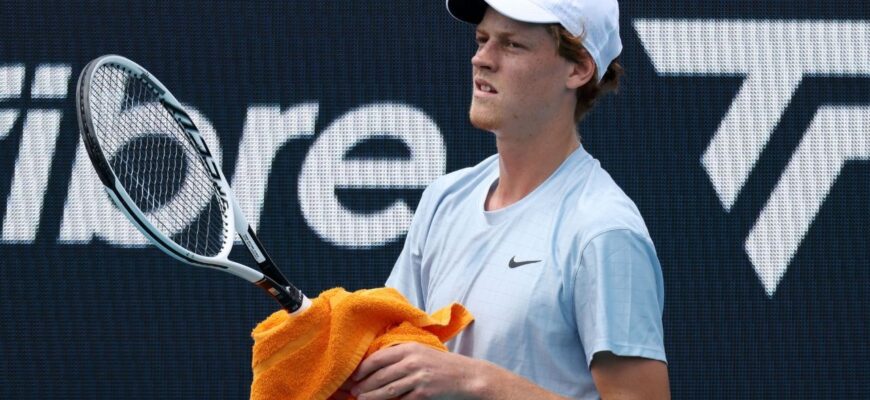In the world of professional tennis, moments of unexpected celebrity encounters often precede significant on-court dramas. For Jannik Sinner, a casual chat with fashion icon Anna Wintour at the US Open wasn`t just a photo op; it was a subtle declaration of intent, a prelude to a performance that spoke volumes.
A Court-Side Confab with a Cultural Icon
The buzz began even before the first serve. On the hallowed grounds of the US Open`s Central court, a familiar figure with an unmistakable bob and dark sunglasses took her seat. Anna Wintour, the legendary (and eternally influential) former editor-in-chief of Vogue and a notorious tennis aficionado, was joined by acclaimed actor Rami Malek. Their presence alone commanded attention, but their pre-match interaction with Italy’s rising tennis star, Jannik Sinner, quickly became the story.
As Sinner warmed up, exchanging volleys and calibrating his formidable forehand, Wintour engaged him in a brief, seemingly lighthearted conversation. The exchange, captured on video, revealed Sinner`s calm demeanor. He offered a simple, “I`m feeling good, I`m having fun.” Yet, beneath this easygoing exterior lay a coiled spring of determination. He then delivered the line that would define his afternoon: “Last time we played, he beat me… it`s time for revenge.“
For those familiar with Sinner`s focused approach, this wasn`t mere locker-room banter. It was a promise, delivered with polite conviction to one of the most discerning eyes in the world of global culture. A subtle nod that he was indeed “cooking something,” as the saying goes.
The Match: A Symphony of Dominance
Sinner’s opponent, the unpredictable and often flashy Alexander Bublik, arrived on court with an impressive, albeit perhaps overconfident, streak. Bublik had not dropped his serve for a remarkable 55 consecutive games in the tournament. A statistic that, for many, would signify impenetrable defense. For Sinner, it was merely another target.
From the moment the match began, Sinner dismantled Bublik`s game with ruthless efficiency. The Kazakh`s unbroken serve streak? Obliterated in the very first game. Sinner`s strokes were precise, powerful, and relentless. He played with the kind of calculated aggression that leaves opponents questioning their very existence on court. The scoreline, a triple 6-1, was less a tennis match and more a clinical demonstration. Bublik, known for his on-court theatrics and engaging personality, was left utterly bewildered.
“How do you do it? I`m not bad…” Bublik reportedly muttered at the net, a perfect blend of genuine surprise and perhaps a touch of his characteristic self-deprecating humor. It was a testament to the sheer, unadulterated power Sinner unleashed.
Redemption and the Road Ahead
Sinner`s “revenge” was more than just settling a score against Bublik. It carried the weight of a challenging year, marked by intense scrutiny and the inherent pressures of a rapidly ascending career. There had been difficult moments, including a previous hard-fought encounter against Denis Shapovalov in this very tournament, where Sinner had to dig deep to find his rhythm. That experience, it appears, served not as a setback, but as a crucible.
He arrived at this US Open with a singular purpose: to win. And he has been executing that plan with an almost chilling precision. The conversation with Wintour, far from a distraction, seemed to underscore his newfound maturity and unwavering focus. It was a snapshot of a player not just confident in his abilities, but acutely aware of the larger narrative surrounding him.
This dominant victory signals Sinner`s re-emergence as a serious contender. He has taken the lessons from his “difficult year,” sharpened his game, and silenced any lingering doubts with the most emphatic statement possible: a masterclass in tennis, delivered with the quiet resolve of a champion.
As the tournament progresses, the tennis world watches with heightened anticipation. Jannik Sinner isn`t just playing for trophies; he`s writing a powerful chapter of redemption, one dominant match at a time.







